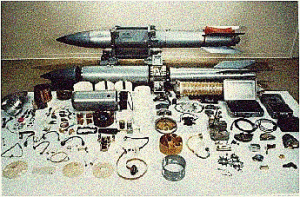The National Nuclear Security Administration’s new Stockpile Stewardship and Management Plan is as grandiose as it is unconscionable.
By Russ Wellen
 In its most recent press release, the Los Alamos Study Group(LASG) explains how President Obama’s recent speech in Berlin reaffirming his ostensible commitment to nuclear disarmament is contradicted by plans to lock their existence in for at least the next 25 years. Many readers may not be exposed to the LASG’s work. Hence, from another one of the most eloquent series of press release you’re likely read (emphasis added). Read the rest of this entry »
In its most recent press release, the Los Alamos Study Group(LASG) explains how President Obama’s recent speech in Berlin reaffirming his ostensible commitment to nuclear disarmament is contradicted by plans to lock their existence in for at least the next 25 years. Many readers may not be exposed to the LASG’s work. Hence, from another one of the most eloquent series of press release you’re likely read (emphasis added). Read the rest of this entry »

